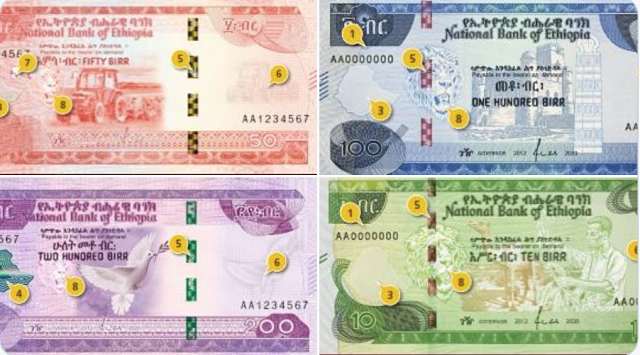 Prime Minister Abiy Ahmed, who unveiled new currency notes, claimed the step will combat hoarding, counterfeiting, corruption, and other ills afflicting the economy. The banks have been asked to start immediately issuing new notes. (Photo: FBC)
Prime Minister Abiy Ahmed, who unveiled new currency notes, claimed the step will combat hoarding, counterfeiting, corruption, and other ills afflicting the economy. The banks have been asked to start immediately issuing new notes. (Photo: FBC)
Addis Getachew Tadesse | ADDIS ABABA, Ethiopia
Ethiopia demonetizes banknotes to salvage economy
Ethiopia on Monday demonetized its currency but gave three months window to people to exchange old currency notes from the banks.
Prime Minister Abiy Ahmed, who unveiled new currency notes, claimed the step will combat hoarding, counterfeiting, corruption, and other ills afflicting the economy. The banks have been asked to start immediately issuing new notes.
“Introducing the changes in our currency notes was deemed necessary to salvage the country’s fractured economy,” the prime minister told a gathering that included ministers, bank governors, and heads of the security agencies.
During the three-month window, both the new and old notes will remain in circulation.
The notes of 100, 50, and 10 denominations will stand canceled after three months, as they have been replaced with new notes. Abiy said the new currency with its better design, security features, and quality of paper will have more longevity and end the menace of counterfeiting.
A new currency note of 200 denomination has also been introduced.

Image via Twitter
The prime minister said the country has spent 3.7 billion birrs ($101.2 million) to print new currency.
In his presentation, Governor of the National Bank of Ethiopia, Yinager Dessie said the newly introduced banknotes will help the country to end hoarding, counterfeiting, corruption, and other ills.
Ethiopia earlier passed directions that any company or an individual can keep cash only up to 1.5 million birrs ($41,000). The cash withdrawal from banks should also not exceed 100,000 birrs ($2,737).
Prime Minister Abiy said his government took numerous measures since coming to power in April 2018 to salvage the fractured economy.
“We inherited a situation where the country had not enough money to make payments for the civil servants,” he said, adding the country had a significant budget deficit and more than the sustainable level of debt.
He further said that over past two years, his government has brought down sovereign debt from 35% to 25% of country’s GDP.
—
Ethiopia Introduces New Currency Notes (FBC)
On Sep 14, 2020
Addis Ababa, September 14, 2020 (FBC) – The government of Ethiopia today introduced new currency notes, with enhanced security features and other distinctive elements.
The new currency notes replace the birr 10, 50 and 100 notes while an additional birr 200 note has also been unveiled.
The birr 5 note remains unchanged and will be turned into coin format soon, according to office of the Prime Minister.
The currency change is aimed at gathering currency circulating informally and outside of financial institutions, curbing corruption and contraband and support financial institutions confront currency shortage.
Most of the print work is currently in country within the National Bank of Ethiopia (NBE) vault, the office added.
Distribution mechanism and planning having been developed and will go in effect through concerned bodies, it noted.
As security plays a key component in the currency change process, a federal command post will be set up to oversee this process with the expectation that Regional Command Posts will also be set up, the office indicated.
The command post will be composed of members from the National Defense Forces, the National Intelligence and Security Service (NISS) and Federal Police.
While Ethiopia has never had a symbol to represent its currency, a new symbol has been designed and will be soon unveiled to symbolize the birr, the office stated.
—
Join the conversation on Twitter and Facebook.

























